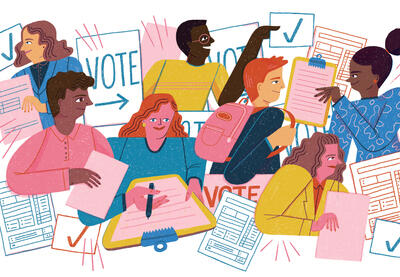With this article from The Marshall Project, educators can facilitate a discussion with students about the rights of citizens returning to their communities after incarceration. They can discuss whether voting is a privilege or a right and whether an individual’s opportunity to vote can justly be removed upon conviction of a crime. Students can also learn about voter engagement, its influence on the electoral process and the impacts of voter disenfranchisement.
A note on teaching through a pandemic:
We recognize that not all educators will be sharing physical or virtual space with students this fall. Because of that, we’ve tried to design these discussion guides in ways that can easily work across classes, whether you’re meeting face to face, in a virtual classroom or through another remote learning model. We’re so grateful to you and all the educators doing extraordinary work in these extraordinary times.
Here’s how you might start:
1. Check Students’ Previous Knowledge
Start the conversation by asking what students know about voter turnout rates in general, including some of the explanations for low voter engagement. Review the meaning of felony disenfranchisement laws and the re-enfranchisement efforts in some states.
You may also explore the current felony disenfranchisement laws in your own state. Students can discuss which issues and offices might be decided differently if incarcerated people and returning citizens could vote.
2. Read Together
Have students read The Marshall Project’s article “In Just Two States, All Prisoners Can Vote. Here’s Why Few Do.”
3. Clarify Student Understanding
Ask students to work individually or in pairs to answer some text-dependent questions using their own words. For example:
- According to the article, what role does race play in felony disenfranchisement laws?
- When did laws barring people with felony convictions from voting first appear? What do voting rights advocates cite as a motivation for these laws?
- What does Joseph Jackson, founder of the Maine Prisoner Advocacy Coalition, suspect accounts for the fact that prisoners in Maine and Vermont never lost the right to vote?
- The article names several barriers to voting, both external and internal, for incarcerated people. What are a few of them?
4. Share Necessary Background
Provide additional resources for students to better understand electoral engagement within the criminal justice system. Here are a few resources you might try.
- Have students compare The Marshall Project’s article with this article from the New Yorker. What are the different approaches of each? Whose experiences and voices are featured? Do the articles rely largely on facts or on stories? Which article do you think is more compelling and why?
- Introduce students to the history behind incarcerated people’s right to vote. Have them explore this timeline on the U.S. history of disenfranchisement for people with felony convictions. What trends can be observed over time? What do they predict about the future of rights for incarcerated and returning citizens?
- Have students explore this map on felony disenfranchisement laws. Which states have the harshest felony disenfranchisement policies? What trends can be observed based on region of the country? Demographics? Political affiliation based on state election returns?
- If students would like to learn more about the growing suffrage movement within the criminal justice system, The Atlantic’s article “In Prison, and Fighting to Vote” addresses this topic in depth.
- Ask students to examine the table “Details on Policies for Restoration of Rights.” In pairs, ask them to compare the language from a state with very limited restoration laws, such as Virginia, with a state with less limited laws. What similarities or differences do you notice in the texts? What might account for them?
Talk Together
Guide students in a discussion about voter disenfranchisement among incarcerated people. Consider beginning with the following questions:
- Some make the argument that those who have been convicted of serious crimes should lose the privilege to participate in the U.S. electoral process. Others assert that all people should retain the right to vote, regardless of their former actions. Do you think voting should be a privilege or a right? Why?
- How do you think elections would change, if at all, if every incarcerated and returning citizen were given the right to vote? What topics might be added to local and national conversations about criminal justice or police reform?
- What, if any, connection do you see between voter apathy within the criminal justice system and voter disaffection within the population at large?
- What is the significance of voting? What message does denying some the right to vote send to members of our society?
For more resources for teaching about elections and voting, check out our Future Voters Project.
